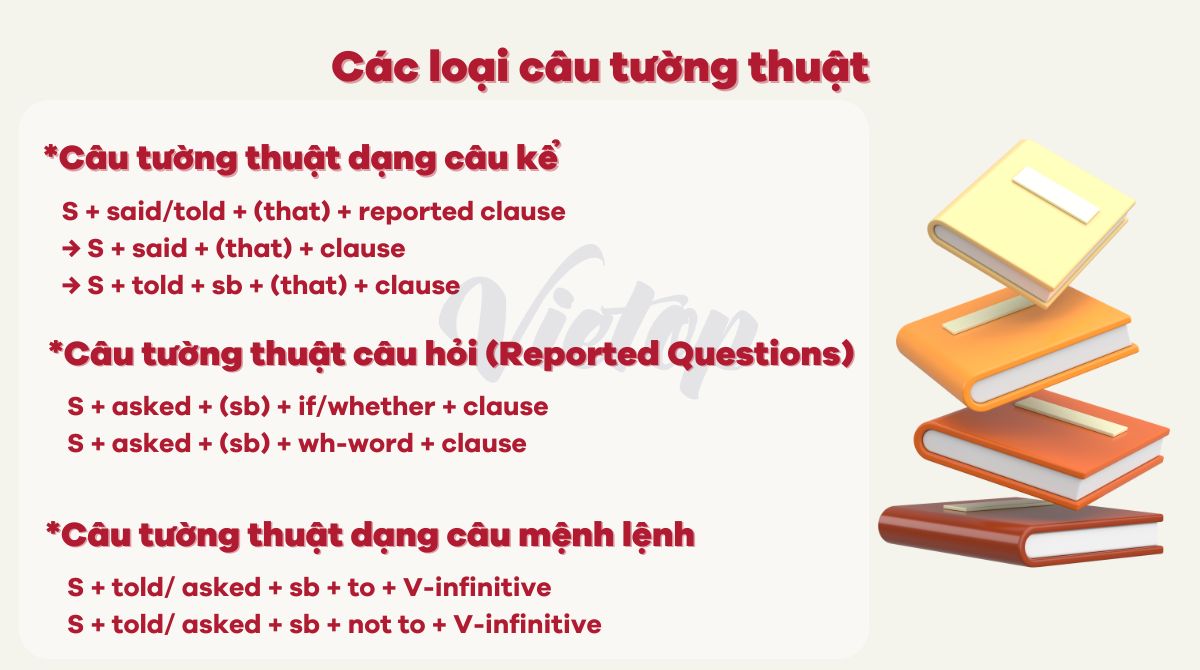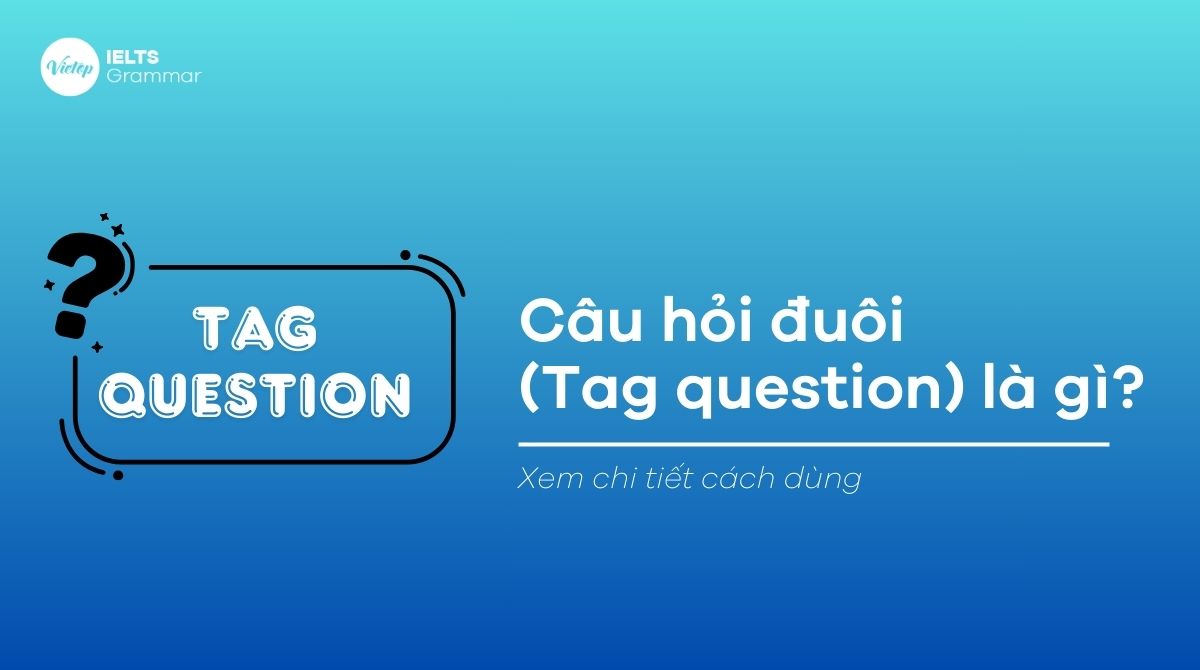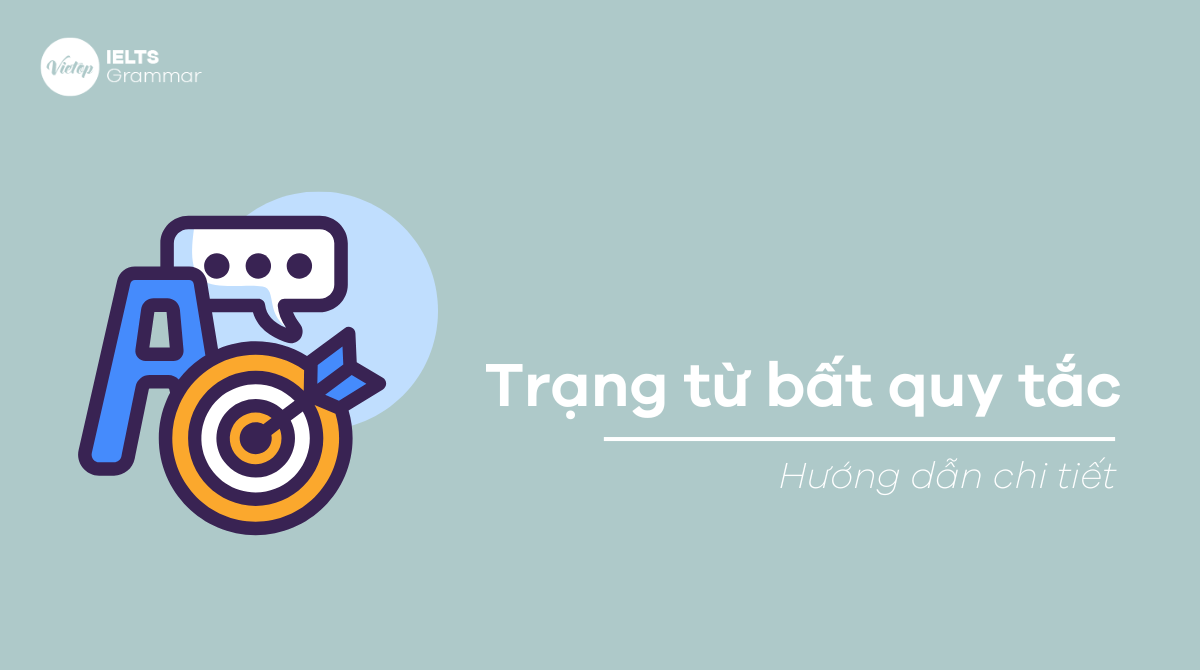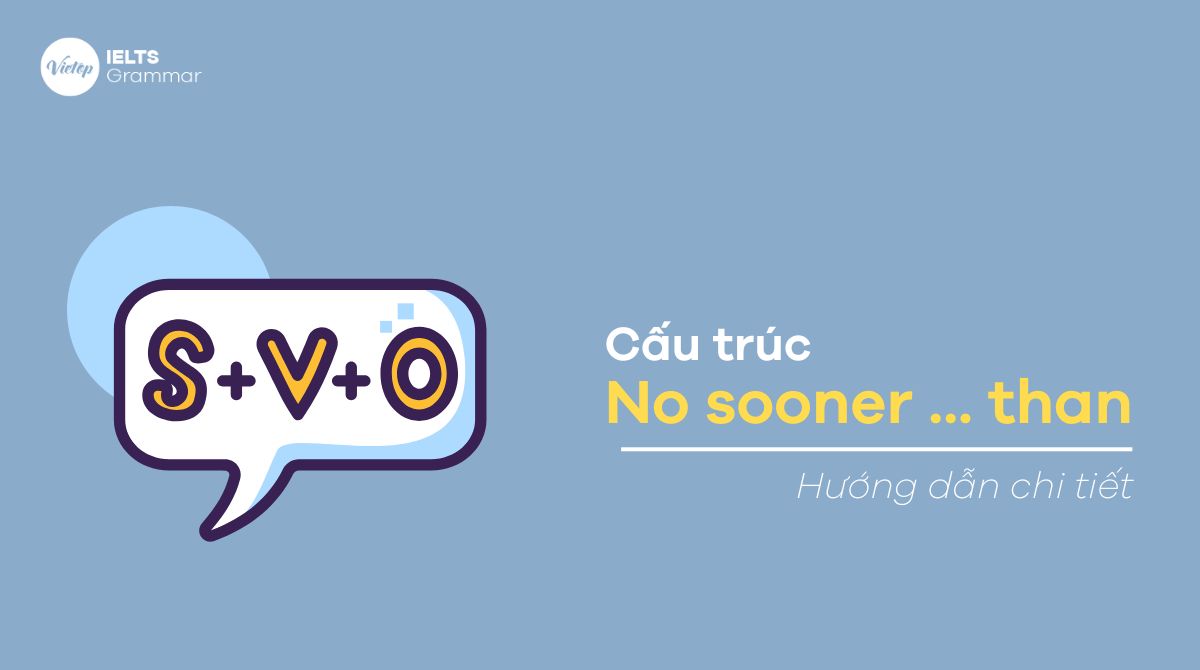Câu tường thuật (Reported Speech) là một trong những chủ đề ngữ pháp quan trọng nhất trong chương trình tiếng Anh lớp 9. Đây không chỉ là kiến thức cần thiết cho các bài kiểm tra và thi tuyển sinh lớp 10 mà còn là nền tảng để học sinh phát triển kỹ năng giao tiếp tiếng Anh hiệu quả.
Trong bài viết này, mình sẽ chia sẻ những kiến thức lý thuyết đầy đủ về câu tường thuật cùng với 50 bài tập thực hành đa dạng, từ cơ bản đến nâng cao. Mỗi bài tập đều có hướng dẫn giải chi tiết giúp bạn hiểu rõ cách áp dụng lý thuyết vào thực tế.
Tìm hiểu ngay!
1. Tóm tắt lý thuyết câu tường thuật lớp 9
Trước khi thực hành bài tập câu tường thuật lớp 9, cùng mình ôn tập nhanh kiến thức trọng tâm về câu tường thuật để giúp bạn nắm chắc kiến thức và luyện tập hiệu quả.

1.1. Định nghĩa câu tường thuật
Câu tường thuật (Reported Speech), hay còn gọi là câu gián tiếp, là câu được dùng khi ta muốn thuật lại hoặc kể lại một lời nói gián tiếp.
E.g.:
- Câu trực tiếp: “I am studying English,” she said.
- Câu tường thuật: She said (that) she was studying English.
1.2. Các loại câu tường thuật
Bên dưới là tổng hợp các loại câu tường thuật thường gặp trong các bài tập thực hành, cùng mình ôn tập nhé!
*Câu tường thuật câu kể (Reported Statements)
Cấu trúc:
| S + said/told + (that) + reported clause |
| → S + said + (that) + clause |
| → S + told + sb + (that) + clause |
E.g.:
- “I am happy,” she said. → She said (that) she was happy.
- “I am busy,” he told me. → He told me (that) he was busy.
*Câu tường thuật câu hỏi (Reported Questions)
Cấu trúc:
| Câu hỏi Yes/No | S + asked + (sb) + if/whether + clause |
| Câu hỏi có từ để hỏi (Wh-questions) | S + asked + (sb) + wh-word + clause |
E.g.:
- “Are you ready?” she asked. → She asked if/whether I was ready.
- “Where do you live?” he asked. → He asked where I lived.
*Câu tường thuật câu mệnh lệnh (Reported Commands)
Cấu trúc:
| Câu mệnh lệnh khẳng định | S + told/ asked + sb + to + V-infinitive |
| Câu mệnh lệnh phủ định | S + told/ asked + sb + not to + V-infinitive |
E.g.:
- “Open the door!” she said. → She told me to open the door.
- “Don’t be late!” he said. → He told me not to be late.
1.3. Bảng quy tắc lùi thì trong câu tường thuật
| Thì trong câu trực tiếp | Thì trong câu tường thuật | Ví dụ |
| Present Simple | Past Simple | “I work” → He said he worked |
| Present Continuous | Past Continuous | “I am working” → He said he was working |
| Present Perfect | Past Perfect | “I have worked” → He said he had worked |
| Past Simple | Past Perfect | “I worked” → He said he had worked |
| Past Continuous | Past Perfect Continuous | “I was working” → He said he had been working |
| Future Simple (will) | Would | “I will work” → He said he would work |
| Can | Could | “I can swim” → He said he could swim |
| May | Might | “I may come” → He said he might come |
1.4. Bảng tổng hợp thay đổi các từ chỉ thời gian và nơi chốn
| Câu trực tiếp | Câu tường thuật |
| now | then/ at that time |
| today | that day |
| yesterday | the day before/ the previous day |
| tomorrow | the next day/ the following day |
| this week | that week |
| last week | the week before/ the previous week |
| next week | the following week |
| here | there |
| this | that |
| these | those |
1.5. Bảng tổng hợp thay đổi đại từ nhân xưng
| Câu trực tiếp | Câu tường thuật |
| I | he/ she |
| you | I/ he/ she/ they |
| we | they |
| my | his/her |
| your | my/ his/ her/ their |
| our | their |
2. Bài tập câu tường thuật lớp 9
Cùng thực hành các bài tập câu tường thuật lớp 9 với các đa dạng các bài tập sau:
- Chọn đáp án đúng nhất.
- Viết lại câu tường thuật.
- Xác định lỗi sai và sửa thành câu hoàn chỉnh.
- Chia động từ đúng theo câu tường thuật.
- Chuyển câu trực tiếp thành câu tường thuật.
Bài tập 1: Chọn đáp án đúng nhất
1. “I am reading a book,” she said.
- A. She said she is reading a book.
- B. She said she was reading a book.
- C. She said she has been reading a book.
- D. She said she read a book.
2. “We will go to the cinema tomorrow,” they told me.
- A. They told me they will go to the cinema the next day.
- B. They told me they would go to the cinema tomorrow.
- C. They told me they would go to the cinema the next day.
- D. They told me they went to the cinema the next day.
3. “I have finished my homework,” Tom said.
- A. Tom said he finished his homework.
- B. Tom said he has finished his homework.
- C. Tom said he had finished his homework.
- D. Tom said he would finish his homework.
4. “Mary is cooking dinner now,” John told us.
- A. John told us Mary cooked dinner then.
- B. John told us Mary was cooking dinner then.
- C. John told us Mary is cooking dinner now.
- D. John told us Mary had cooked dinner then.
5. “I can speak three languages,” she said.
- A. She said she can speak three languages.
- B. She said she could speak three languages.
- C. She said she speaks three languages.
- D. She said she spoke three languages.
6. “We visited Paris last year,” they said.
- A. They said they visited Paris the year before.
- B. They said they had visited Paris the year before.
- C. They said they have visited Paris last year.
- D. They said they visit Paris last year.
7. “I will call you later,” he promised.
- A. He promised he will call me later.
- B. He promised he would call me later.
- C. He promised he called me later.
- D. He promised he calls me later.
8. “She may come to the party,” Mark said.
- A. Mark said she may come to the party.
- B. Mark said she might come to the party.
- C. Mark said she will come to the party.
- D. Mark said she would come to the party.
9. “I am working on this project,” Anna told me.
- A. Anna told me she is working on this project.
- B. Anna told me she was working on that project.
- C. Anna told me she worked on that project.
- D. Anna told me she has worked on that project.
10. “They have been living here for five years,” she said.
- A. She said they have been living there for five years.
- B. She said they had been living there for five years.
- C. She said they lived there for five years.
- D. She said they were living there for five years.
Bài tập 2: Viết lại câu tường thuật
- “I love chocolate ice cream,” she said. → She said ________________________________
- “We are planning a surprise party,” they told me. → They told me ____________________________
- “I have never been to Japan,” he said. → He said ________________________________
- “My sister will graduate next month,” Mary said. → Mary said ______________________________
- “I was watching TV when you called,” Tom said. → Tom said _______________________________
- “We can’t attend the meeting tomorrow,” they said. → They said ______________________________
- “I bought this dress yesterday,” she told her friend. → She told her friend ______________________
- “My parents are visiting us this weekend,” John said. → John said ______________________________
- “I will have finished the report by Friday,” he promised. → He promised ____________________________
- “We have been friends for ten years,” they said. → They said ____________________________
Bài tập 3: Xác định lỗi sai và sửa thành câu hoàn chỉnh
- She said that she is going to the store tomorrow.
- He told me that he can speak French very well.
- They said they will visit us next week.
- Mary said that she has finished her homework yesterday.
- Tom told us that he is working on this project now.
- She said that her brother will come here soon.
- He said that he have never seen that movie before.
- They told me that they are living in New York for five years.
- She said that she can’t attend the meeting tomorrow.
- John said that he was born in 1995 and he is 25 years old now.
Bài tập 4: Chia động từ đúng theo câu tường thuật
- She said that she _______ (study) English for three years.
- They told me that they _______ (not/see) him since last month.
- He said that he _______ (go) to London the following week.
- Mary told us that she _______ (work) as a teacher then.
- Tom said that he _______ (finish) his project by the end of that month.
- She told me that she _______ (can/not) speak Chinese.
- They said that they _______ (live) in that house for ten years.
- He told us that he _______ (be) very busy the day before.
- She said that her sister _______ (get) married the following year.
- John told me that he _______ (never/travel) to Asia before.
Bài tập 5: Chuyển câu trực tiếp thành câu tường thuật
- “I am very tired today,” she said.
- “We will move to a new house next month,” they told us.
- “I have just received a letter from my friend,” he said.
- “My mother is cooking dinner in the kitchen now,” Mary said.
- “I can’t find my keys anywhere,” Tom said.
- “We visited the museum yesterday,” they said.
- “I will call you as soon as I arrive,” she promised.
- “My brother may not come to the party,” John said.
- “I was reading a book when the phone rang,” he told me.
- “We have been waiting for you for an hour,” they said.
3. Kết luận
Câu tường thuật là một chủ đề ngữ pháp quan trọng trong chương trình tiếng Anh lớp 9, đòi hỏi bạn phải nắm vững các quy tắc lùi thì, thay đổi đại từ và các từ chỉ thời gian, địa điểm. Thông qua 50 bài tập câu tường thuật lớp 9 đa dạng trong bài viết này, bạn đã có thể vận dụng thành thạo kiến thức vào các bài tập từ cơ bản đến nâng cao.
Để vận dụng tốt câu tường thuật, bạn cần:
- Học thuộc bảng quy tắc lùi thì
- Thực hành thường xuyên với các dạng bài tập khác nhau
- Chú ý đến việc thay đổi đại từ và từ chỉ thời gian, nơi chốn
- Đọc kỹ đề bài để xác định đúng cấu trúc cần sử dụng
Chúc bạn học tập tốt và đạt kết quả cao trong các kỳ thi sắp tới!






![[Mới nhất] Cập nhật bảng tổng hợp quy đổi điểm IELTS sang điểm xét tuyển đại học khu vực phía Nam 2025](https://vietop.edu.vn/wp-content/uploads/2025/12/thumbnail-cap-nhat-bang-quy-doi-diem-ielts.jpg)


